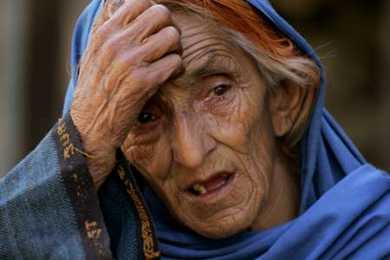|
|
Quake Pushes Pakistan's Health System to Breaking Point
Agence
France-Presse
Pakistan
October 14, 2005

An elderly Kashmiri quake survivor cries for humanitarian aid in Kandi, near the LOC (Line of Control) in Indian-administered Kashmir, October 13, 2005. A steady flow of relief supplies rumbled into parts of Pakistan's earthquake zone on Thursday but distribution was patchy and some of the most remote and needy communities had yet to see a scrap of aid. In the Karnah region next to Pakistan border, officials said tens of thousands face a serious threat to their health and lives from fast-dipping temperatures and snow in the coming weeks if not provided tarpaulin tents or alternative housing.
REUTERS/DESMOND BOYLAN
Pakistan's massive earthquake has strained to breaking point an already patchy medical system, with hospitals in ruin, doctors dead and tens of thousands needing urgent treatment.
Pakistan ranks near the bottom of international rankings in public spending on health and the disaster shattered the infrastructure in one of its poorest - and now most needy - regions.
"Quite simply, we are no match for this big a tragedy," said Arshad Rana, president of the Pakistan Medical Association.
The United Nations says 1,000 medical facilities were completely destroyed in Saturday's earthquake, a critical shortage amid fears of disease due to the decomposing bodies and imminent cold weather.
With around 63,000 people injured, the Islamabad government has dispatched 30 medical teams to the ravaged areas, officials said. International aid, volunteers and the military have picked up some of the burden, with six foreign mobile hospitals operating as of Thursday.
In the overflowing makeshift camps in the disaster areas, the needs are so great that only the most desperate victims are flown out as doctors struggle to keep up.
In the capital Islamabad, where the most seriously injured are taken, hospitals' capacity has nearly been doubled by setting up beds in all available space such as hallways, Health Secretary Anwar Mahmood said.
"So far we haven't turned down any patient," he said.
The government has sprayed disaster sites to contain disease after the more than 25,000 deaths and launched a vaccination drive. But in the long term, Pakistan will have to reconstruct a health system in areas where it has been reduced to zero.
Health Minister Mohammed Nasir Khan said all seven doctors in the badly hit town of Balakot had died along with their families and that much of the medical staff in Kashmir was also killed.
"Demoralization is tremendous in the Azad Kashmir government," he said, using Pakistan's name for its side of the territory divided with India. "We are sending a team of 200 doctors and administrators to run the health care system in Azad Kashmir."
Hussein Gezairy, the visiting regional head of the World Health Organization, said that reaching the mass of victims isolated in the mountains would be more difficult than assisting survivors of December's Indian Ocean tsunami.
He said at least one million people were in immediate need of humanitarian assistance such as water, food and basic health care.
"To reach the injured is the number one target for us but also we have to think about rebuilding. It is going to be a huge undertaking and I hope actually that all the countries will support Pakistan," he said.
If history is a guide, that commitment is not for certain. Pakistan ranks number 135 of 177 countries in health expenditure per capita on the UN Development Program's Human Development Index.
Military spending in the nuclear-armed nation makes up about five percent of Gross Domestic Product, compared with 3.2 percent on health.
Rana said the Pakistan Medical Association had been pushing for years for the government to double its GDP commitment to health.
"On such occasions, it's not a question of GDP, they have given millions of rupees for medical assistance," Rana said, referring to the government.
"But if we had started building this infrastructure two decades back, probably the infrastructure would have been much more able to cope," he said.
|
|



